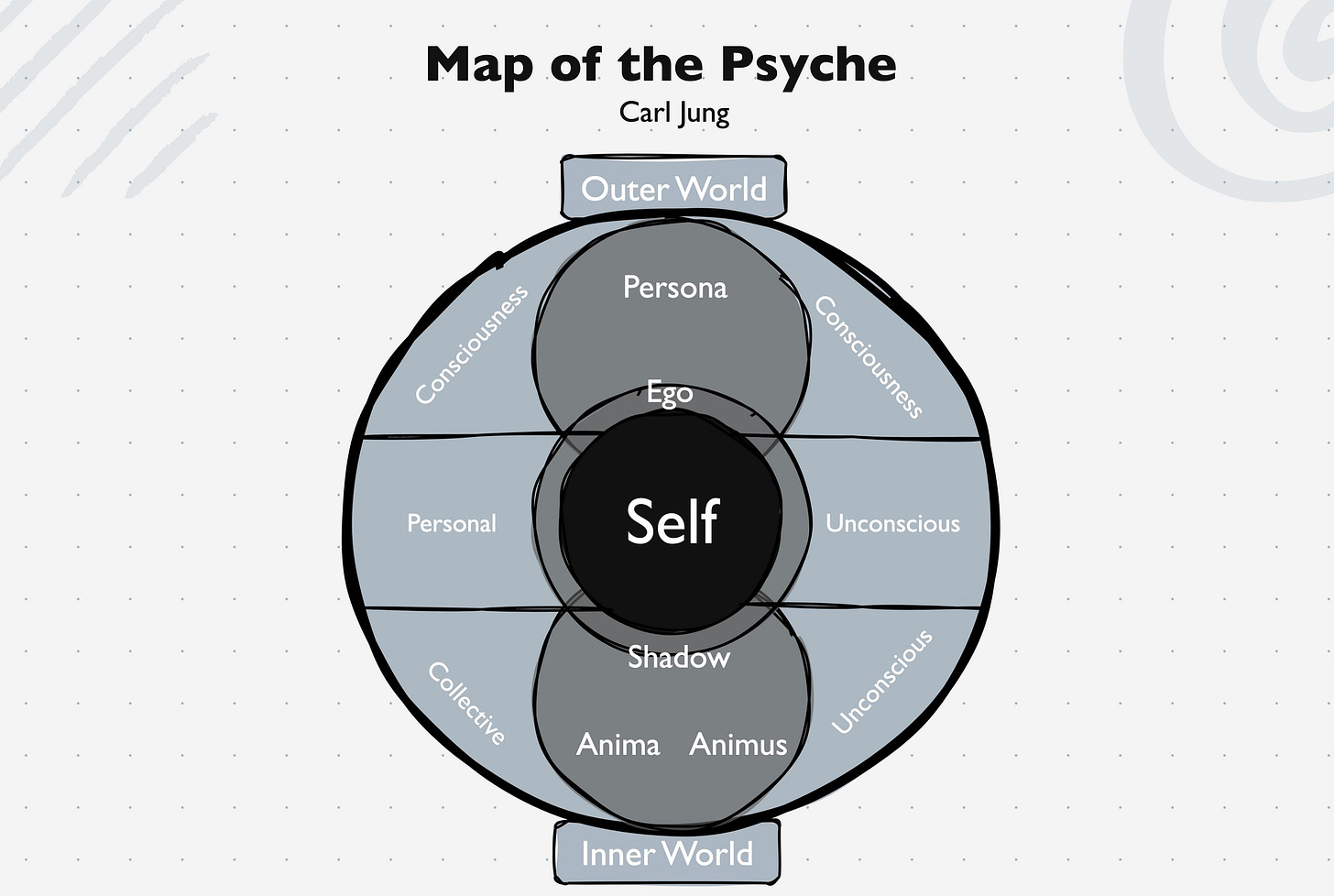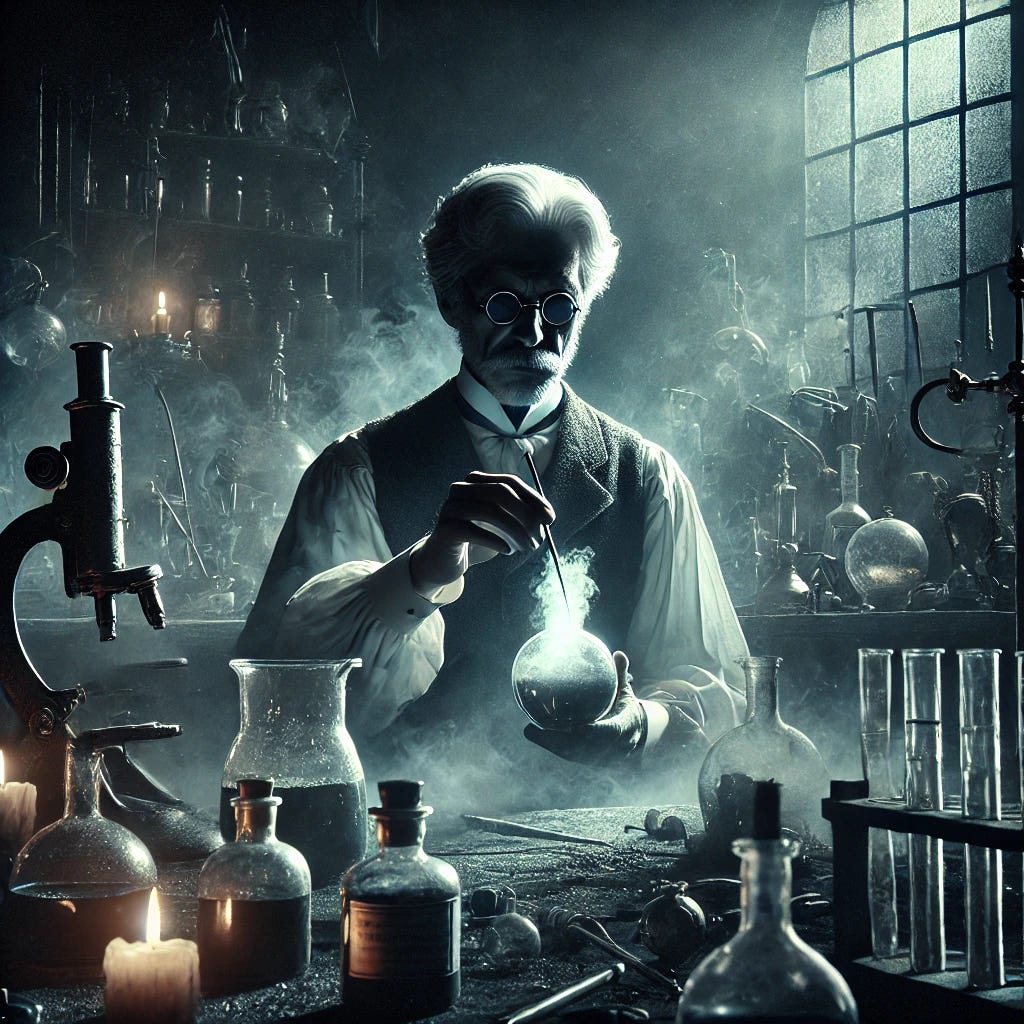Introduction
In our previous article, "Beyond the Bargain: Insights from a Deal with the Devil," we explored the tales of "Faust" and "The Fisherman and the Genie" to delve into reflective wisdom, focusing on themes of insight and critical self-reflection. Reflective wisdom, one of the three core components of wisdom alongside cognitive and affective dimensions, is crucial for leaders. It involves seeing situations from multiple perspectives, critically examining oneself, and humbly acknowledging one's limitations and biases. This form of wisdom is essential for making informed judgments, regulating emotions, and leading authentically.
The tale of Faust elucidates the perilous consequences of unchecked ambition. His pact with Mephistopheles reveals the costs of indulging an unintegrated shadow and the power of redemption through service to others. The Fisherman and the Genie ‘underscores’ the importance of situational awareness. The fisherman's emotional maturity and adeptness at leveraging his strengths starkly contrast with the genie's lack of accountability and descent into bitterness. Both stories demonstrate the power of reflective wisdom crucial to contemporary leadership success.
The premise of this series of articles hinges on the importance of vertical development for leadership success, as elaborated in "Be More Alchemist." Vertical development, as defined by Tolbert and others, emphasises the evolution of leaders through distinct stages of maturity, from the Individualist to the Alchemist. Leaders who succeed in this journey are more authentic, emotionally intelligent, ethically grounded and handle nuance, enabling them to respond adeptly to the complexities of their roles. This transformative path is impossible without the crucial individuation process.
This discourse, consequently, delves more deeply into these concepts. Individuation, as previously discussed, is the process of harmonising the conscious and unconscious aspects of the Self, achieving psychological wholeness and self-realisation. This journey necessitates confronting and integrating the shadow — the repressed parts of our personality, including fears, desires, and traits we deem socially unacceptable. The significance of individuation lies in its capacity to help leaders achieve a harmonious and integrated self, allowing them to lead with greater authenticity and resilience.
To illustrate these ideas, we will explore the story of "Dr Jekyll and Mr Hyde". This tale offers insights into the complexities of human nature and the necessity of integrating the shadow for effective leadership. By examining this story, we shed light on the high cost of a discordant self and the transformative power of reflective wisdom in achieving authentic leadership.
To delve deeper into reflective wisdom and better understand individuation and shadow integration, let us first explore the Jungian concept of the Self. The Self represents the totality of the conscious and unconscious mind. Grasping the Self's significance helps us to appreciate why individuation and integrating the shadow are vital for vertical leadership development.
The Self: The Authentic Whole
The Self embodies psychological wholeness, encompassing all aspects of an individual's psyche and serving as the ultimate goal of personal maturity. In this state, one lives in harmony with all aspects of one's psyche, fully aligning perceived experience with reality. Understanding the totality of a person in Jungian terms involves recognising the roles of all components of the psyche: the ego, persona, shadow, anima/animus, personal unconscious, collective unconscious, and the Self.
The ego is the centre of consciousness, housing our thoughts, memories, and perceptions, and is responsible for our sense of identity and managing our interactions with the world. The persona is the social mask we wear, allowing us to navigate interactions while protecting our authentic Self. The shadow comprises the darker, repressed parts of our personality, such as fears, desires, and traits we perceive as socially unacceptable. The anima and animus represent the unconscious feminine and masculine aspects respectively; integrating these brings balance, enriching our behavioural range typically with empathy and assertiveness.
The personal unconscious holds memories and experiences not currently in conscious awareness, while the collective unconscious, shared among all humans, contains archetypes and universal symbols that influence our behaviours and connect us to humanity's broader experience. Finally, the Self is the overarching archetype that integrates both conscious (ego) and unconscious facets. A fully integrated Self is the ultimate goal of individuation, where one achieves psychological wholeness and lives in harmony with all aspects of one's psyche.
Maturing the Self is foundational for leaders as it enables them to understand their external experiences more accurately, mitigating biases, blind spots, and unconscious desires that lead them astray. Achieving psychological wholeness allows leaders to experience reality accurately, leading to better judgment. Furthermore, leaders who integrate their whole Self can drop their veil and engage authentically in all social encounters, presenting their true selves without fear, thus building trust and credibility.
The individuation process, which involves comprehensively integrating the various aspects of the psyche, is central to realising the Self. Individuation entails acknowledging the persona by recognising the limitations of the social mask we wear, confronting the shadow by facing and integrating the darker, repressed parts of our personality, and integrating the anima/animus by balancing the unconscious gender-specific traits within us.
Fully realising the Self is an ongoing journey of self-discovery and growth. Leaders progressing along this path navigate their roles with clarity and integrity, balancing rational thought with intuitive insight, and ethical considerations with practical decision-making. A mature Self enables leaders to act consistently, aligning inner motivations with outward actions. This alignment fosters a more authentic, empathetic, and resilient approach to guiding their teams and organisations, enhances robust judgment, and supports personal well-being.
With this foundational understanding, we now turn to the story of "Dr Jekyll and Mr Hyde" to illustrate the high cost of a discordant self and the transformative power of integrating the shadow for effective leadership.
Dr Jekyll and Mr Hyde
In Robert Louis Stevenson's "Strange Case of Dr Jekyll and Mr Hyde," the story is primarily told from the perspective of Mr Gabriel John Utterson, a lawyer and close friend of Dr Jekyll. Throughout the tale, Utterson is troubled by the mysterious relationship between Jekyll and Hyde. Only towards the end of the story, through Jekyll's confession letter, are the full details of Hyde's origin and Jekyll's motivations revealed. In the following retelling, the story is told from Dr Jekyll's perspective while maintaining fidelity to the original story.
Dr Henry Jekyll was a handsome and upstanding physician in London, well-regarded by his peers. From a young age, he had recognised the duality of human nature — the coexistence of good and evil within each person. In his youth, Jekyll indulged his wilder side but consciously repressed the reprehensible aspects of his temperament as he grew older to solidify his status in London society. Despite this, Jekyll was dissatisfied with the constraints of his respectable life and yearned for the freedom to explore the darker aspects of his disposition.
Driven by scientific curiosity and a desire for personal liberation, Jekyll embarked on experiments to separate his good and evil natures. After years of research, he discovered a potion that suppressed the benevolent aspects of his personality. The first time Jekyll took the brew, he experienced an exhilarating transformation — becoming Edward Hyde, a smaller, younger, and repugnant figure. Hyde indulged in immoral and base activities he would never entertain as Dr Jekyll, experiencing a sense of release from the constant pressure to conform.
At first, Jekyll maintained strict control over the transformations. He rented a separate residence for Hyde in a disreputable part of London, allowing him to separate his two lives. As Hyde, he engaged in increasingly depraved and violent acts, finding perverse satisfaction in freedom from morality. One night, while walking through the streets of London as Hyde, he encountered a young girl. In a moment of unrestrained brutality, he trampled her without remorse — marking a significant slide into further moral decay.
As time passed, the transformations began spontaneously, independent of the tonic. This alarming loss of control filled Jekyll with fear, compelling him to cease using the elixir. Despite his efforts to suppress his darker urges, Jekyll eventually succumbed to temptation. Hyde emerged darker and more malevolent than before. This culminated in the unprovoked murder of Sir Danvers Carew, a distinguished and innocent gentleman. This heinous act left Jekyll overwhelmed with guilt and dread — finally fully grasping the monstrous nature of what he had unleashed.
Now a wanted murderer, a guilty and fearful Jekyll resolved never to retake the potion. He destroys the key to Hyde's residence and focuses on leading a virtuous life, hoping to suppress the darker side of his disposition. He resumed his social activities and appeared to be in good spirits.
The spontaneous transformations, however, did not cease. One day, while sitting in Regent's Park, Jekyll felt the familiar sensation of a transformation. Unable to return to his home as Hyde, he sought refuge in the house of an old friend, Dr Lanyon. Jekyll wrote a desperate letter to Lanyon, asking him to retrieve the tonic from Jekyll's laboratory and take it to his home. Lanyon complied, and Jekyll drank the elixir in front of him, transforming back into himself [1].
Realising that he could no longer control Hyde and that his supply of a crucial ingredient for the tonic was running out, Jekyll became increasingly isolated and paranoid, knowing he risked being trapped as Hyde forever. Despite his efforts, he could not replicate the original potion, as one of the initial chemicals had contained an impurity that made the transformation possible.
In his final days, Jekyll locked himself in his laboratory. Hyde was becoming stronger, and Jekyll's ability to change back into himself was diminishing. His last act before committing suicide was to complete his account, detailing the tragic consequences of his hubris and the experiments that led to his downfall. His death, marked by his full emergence into Hyde, serves as a cautionary tale of the dangers of tampering with the dual nature of humanity and the tragic results of failing to integrate and control one's darker side.
Utterson, Jekyll's friend, discovered Hyde's body and confession, concluding the story.
Navigating the Psyche
The tale of "Dr Jekyll and Mr Hyde" offers important insights into contemporary leadership success, especially considering the alignment between Jekyll's reflections and Jung's psychological theories. In his final and redemptive confession, Jekyll muses on the complexity of human nature, stating, "I hazard the guess that man will be ultimately known for a mere polity of multifarious, incongruous, and independent denizens." This insight closely aligns with Jung's concepts of the psyche, which include the shadow, anima/animus, and the collective unconscious. Jekyll's realisation underscores the importance of acknowledging and integrating these various aspects of our personality into a cohesive Self. As we explore the lessons from the story, we will see how Jekyll's failure to integrate these "denizens" leads to his tragic downfall, emphasising the critical need for leaders to embrace reflective wisdom and holistic self-understanding.
Integration of the Shadow
Jekyll consciously suppressed his shadow to fit Victorian society's values, showcasing a virtuous persona while leaving his Self unintegrated. Instead of integrating his shadow into his Self, Jekyll allowed his dark side to engage with the world unchecked. The consequences are clear: unintegrated and without moral controls, Hyde's shadow eventually overwhelms the ego and persona, gaining power and becoming the dominant aspect of the Self.
Leadership Reflections:
Shadow integration: Understand and integrate the darker aspects of your personality to avoid ethical lapses and maintain integrity.
Positive traits: Identify and integrate the positive aspects of the shadow to enhance your behavioural armoury — supporting success across a broader range of situations [2].
Dangers of Repression
Hyde's smaller, younger, and gruesome appearance symbolises Jekyll's repressed side's stunted and underdeveloped character. This suggests that the aspects of ourselves we suppress do not thrive but manifest as twisted and diminished parts of our personality. The story starkly illustrates the perils of unrestrained impulses. By repressing his shadow side, Jekyll sets the stage for it to manifest in uncontrolled and destructive ways. Hyde's progressively malevolent behaviour is a direct consequence of this repression. Over time, as Hyde's actions become increasingly violent and depraved, the energy required to maintain this separation becomes unsustainable.
Repression Reflections
Repressing the shadow: Suppressed parts of ourselves manifest as distorted and weakened aspects of our personality. Repressing the shadow results in these subdued aspects manifesting in more destructive ways.
Darker consequences: Unresolved and unacknowledged parts of our psyche can grow more powerful over time, leading to loss of control.
Secret indulgences: Hiding one's shadow, only letting it out to play when others aren't watching, does not resolve underlying issues.
Humility and Authentic Living
Delving deeper into why Jekyll found himself in this precarious state, it becomes evident that his prideful and egotistical nature played a significant role. His belief that he could control his dual personality reveals arrogance and hubris. Instead of integrating his shadow and striving to act authentically within societal norms, Jekyll allowed Hyde to indulge in immoral pleasures without facing moral consequences. This desire for unaccountable freedom is ultimately unsustainable and destructive. Jekyll's plight underscores the importance of humility and the willingness to confront and integrate all aspects of one's personality. The seemingly straightforward path of compartmentalisation and repression leads to fragmentation and chaos, as evidenced by Hyde's dominance. Authentic living, characterised by a balanced and integrated Self, requires self-reflection, compassion, and the courage to face darker impulses head on. Through this rigorous process, one can achieve true psychological wholeness and lead a life of integrity and inner harmony.
Authenticity Reflections:
Authenticity: Psychological health starts with being true to yourself and acknowledging all aspects of your personality.
Ethical responsibility: Moral governance is critical across all our lives.
Naivety and downfall: Believing that you lack a shadow side or are incapable of malevolence, or think that you can suppress, compartmentalise, or manage it without consequence, is profoundly naïve — leading to harm to oneself and others.
Trusting Intuition
Despite the lack of explicit evidence, people's instinctual recognition of malevolence when encountering Hyde underscores the importance of trusting our intuition. This primal sense of unease is crucial, urging us to heed our inner warnings.
Trust Reflections:
Intuitive sense of evil: Trust and act on your intuition if someone makes you uneasy — be sceptical of their persona.
Impact on Others
Jekyll's actions, through Hyde, have devastating effects not just on himself but on others around him, including the trampling of the young girl and the murder of Sir Danvers Carew. This illustrates how the slow progress at individuation and the fallout of failing to integrate one's shadow can harm innocent people and relationships.
Impact Reflections:
Impact on colleagues: Mismanagement of darker impulses harms others.
Avoiding External Dependencies
The failure to integrate the shadow and other psychological aspects leads to inner conflict and unresolved psychological tensions. These unresolved issues can drive individuals to seek external means, such as alcohol and drugs, to manage or escape inner turmoil. Jekyll's increasing reliance on his potion to control Hyde illustrates how external substances can temporarily mask underlying issues, providing a fleeting sense of control but ultimately leading to a more significant loss of autonomy and escalating the problems they are meant to solve.
Dependency Reflections:
Substance abuse: Reliance on alcohol or drugs to numb the pain resulting from conflicts of the psyche results in a loss of autonomy and control, ultimately exacerbating the underlying issues.
The Integrated Shadow in Leadership Success
The journey toward individuation and outstanding leadership involves integrating aspects of the shadow — traits, some of which, if overdone, are detrimental but add something uniquely value-creating when applied with maturity. While it is not easy to judge from the outside, leaders like Jeff Bezos, Elon Musk, and Martha Stewart exemplify how harnessing shadow traits can drive remarkable success.
Jeff Bezos: Bezos' intense and sometimes ruthless business practices have revolutionised the retail industry. His relentless customer satisfaction and innovation focus have driven Amazon to unparalleled heights. Bezos' ability to channel his intensity into strategic decisions and robust implementation, like launching Amazon Prime and AWS, showcases how integrating aggressive traits constructively drives significant growth.
Elon Musk: Musk's single-minded revolutionary focus and willingness to take extreme risks have positioned him as a transformative figure in multiple industries. His bold vision for Tesla and SpaceX and his relentless pursuit of seemingly impossible goals have led to groundbreaking advancements in electric vehicles and space exploration. Musk's integrated shadow, marked by his focus and revolutionary risk-taking, demonstrates the power of authenticity and unbridled ambition in achieving monumental success.
Martha Stewart: Stewart's controlling nature and perfectionism have built a cohesive, trusted brand in homemaking and lifestyle. Her meticulous attention to detail and high standards have ensured that her products and media consistently resonate with quality and style. Stewart has become synonymous with elegance, reliability, and practical living solutions by embracing her perfectionist traits and channelling them into her brand [3].
These leaders illustrate that outstanding success often stems from effectively integrating shadow traits into their leadership style. Their authenticity and ability to constructively harness traits like intensity, risk-taking, and perfectionism are hallmarks of leaders on the path to individuation. These examples underscore acknowledging and utilising the shadow self to achieve extraordinary leadership success.
Senior Leadership Failures — Poor Individuation
When senior leaders fail, their ethics and integrity often come under scrutiny. While moral failings are undeniably a factor, the issue is more complex than simply not knowing right from wrong. Most leaders certainly know the difference; the question is why they chose to indulge their darker side, like Hyde. A significant part of the answer lies in their lack of individuation.
Adam Neumann: Neumann co-founded WeWork, which provides shared workspaces for startups, freelancers, and businesses. Founded in 2010, WeWork quickly became a significant player in the real estate and tech industries, eventually reaching a valuation of $47 billion. Grandiose ambitions marked Neumann's leadership style. He made impulsive decisions and pursued rapid, unsustainable growth. His extravagant personal spending and the blurring of personal and professional boundaries reflected his inability to integrate ethical responsibility and a balanced self-image. In 2019, as WeWork prepared for an initial public offering (IPO), significant concerns about Neumann's leadership and the company's financial stability came to light. The IPO was ultimately withdrawn, and WeWork's valuation plummeted. Neumann was forced to resign as CEO, and the company faced significant restructuring to recover from the fallout.
Dov Charney: Charney founded American Apparel, a clothing company known for its made-in-USA products and provocative advertising. The company gained popularity for its trendy clothing and ethical manufacturing practices. Charney's leadership was highly controversial due to his inappropriate behaviour, including sexual harassment allegations and creating a toxic work environment. His inability to separate personal conduct from professional responsibilities and his failure to maintain ethical boundaries highlight his lack of individuation. In 2014, Charney was ousted by the company's board of directors as CEO of American Apparel. The company struggled to recover from the scandals and eventually filed for bankruptcy. Charney's leadership issues were a significant factor in the company's decline.
These leaders illustrate that there is more to leadership failure than simply knowing right from wrong. Their indulgence of their shadow traits — whether through grandiosity, lack of self-awareness, or ethical lapses — demonstrates the critical importance of integrating these aspects of the Self. Understanding and addressing the shadow can prevent the excesses and moral failings that lead to significant personal and organisational downfall.
Shadow Work
One of the significant lessons in Hyde's story revolves around people's reactions to him, particularly their difficulty in describing him. This symbolises the elusive nature of our unconscious and shadow side. The inability to pinpoint Hyde's characteristics signifies the challenge of confronting and understanding the unconscious aspects of our psyche, which operate beyond our rational understanding.
The optimum strategy, shadow work, involves bringing the shadow into consciousness through reflective practice and seeking to integrate it into the Self. This process requires a compassionate approach towards oneself, developing a tolerance for perceived imperfections, and treating oneself with the same kindness and understanding offered to a loved one. Compassionate self-acceptance is the foundation for true integration, enabling one to manage and channel darker impulses healthily rather than allowing them to erupt uncontrollably.
There are many routes to shadow work, including therapy and reflective practice groups. More commonly, shadow work involves journaling, mindfulness, and creative expression.
Journaling: Journaling unveils hidden aspects of the psyche by reflecting on thoughts and emotions. Regular writing about experiences that trigger strong feelings allows exploration of underlying patterns and motivations. Structured journaling on themes like anger, fear, and jealousy can illuminate shadow aspects, making them more conscious and manageable.
Mindfulness: Mindfulness enhances self-awareness and acceptance by observing thoughts without judgment. Regular mindfulness meditation helps one notice internal reactions and habitual thought patterns, creating space to understand and integrate shadow elements. This heightened awareness aids in managing darker impulses healthily.
Creative Expression: Creative expression through art, writing, or music facilitates non-verbal exploration of the unconscious. Engaging in creative activities provides a safe outlet for repressed emotions and thoughts. Interpreting these creations can reveal hidden parts of the psyche, aiding in the integration of shadow aspects.
We have discussed the importance of journaling in previous articles; for a deeper dive, consider reading the book "Shadow Work Journal" by Keila Shaheen for a preliminary exploration.
Conclusion
The journey toward individuation and effective leadership involves integrating aspects of the shadow self, a concept rooted in Jungian psychology. Jung emphasised the importance of acknowledging and harmonising the unconscious aspects of our personality to achieve psychological wholeness. This process requires reflective wisdom and self-insight, enabling leaders to harness potentially detrimental traits constructively.
The story of "Dr Jekyll and Mr Hyde" vividly illustrates the catastrophic consequences of failing to integrate one's shadow. Dr Jekyll's inability to reconcile his conscious persona with his darker impulses leads to his ultimate downfall, demonstrating the critical need for leaders to confront and integrate their shadow aspects. By ignoring and repressing these parts of ourselves, we risk them manifesting in uncontrolled and destructive ways.
Business leaders like Jeff Bezos, Elon Musk, and Martha Stewart exemplify the positive outcomes of integrating shadow traits. Bezos' intense business practices, Musk's revolutionary risk-taking, and Stewart's perfectionism have all driven remarkable success when channelled constructively.
Embracing and integrating the shadow self leads to a more authentic, empathetic, and resilient leadership style. It enables leaders to experience reality more accurately, mitigate biases, and build trust and credibility by presenting their true selves. This alignment between inner motivations and outward actions fosters better judgment and supports personal well-being.
Integrate your shadow, enhance self-awareness, and lead authentically. Start your shadow work journey today.
References
A Primer of Jungian Psychology, Hall and Nordby, 1999
Jung: A Very Short Introduction, Stevens, 2001
Map of the Soul – Persona: Our Many Faces, Stein, 2019
Man and His Symbols, Jung, 2023
Meeting the Shadow, Zweig and Abrams, 2023
Memories, Dreams, Reflections, Jung, 1995
Owning Your Own Shadow: Understanding the Dark Side of the Psyche – paperback illustrated, Johnson, 1994
Shadow Dance: Liberating the Power and Creativity of Your Dark Side, Richo, 1999
The Shadow Work Journal: The bestselling TikTok global self-help sensation to guide and empower you to improve your mental health and well-being, Shaheen, 2024
The Strange Case of Dr Jekyll and Mr Hyde and Other Tales of Terror, Stevenson (Author), Mighall (Editor), 2003
Wherever You Go, There You Are: Mindfulness Meditation in Everyday, Kabat-Zinn, 2005
Footnotes
[1] Lanyon is a longtime friend of Jekyll. They fell out before the story commences because of Jekyll's research interests. Lanyon dies as a result of the shock of seeing Hyde transform back into Jekyll.
[2] For example, positive traits can be repressed through childhood learning, such as being told to be quiet, resulting in problems in adulthood with being assertive. However, many characteristics have a curvilinear relationship with success, so integrating the shadow comprehensively provides a greater range of behavioural choice, facilitating optimum outcomes.
[3] Martha Stewart exemplifies the complexity of discussing individuation. In 2004, she was convicted for her involvement in insider trading related to the sale of nearly 4,000 shares of ImClone Systems stock in December 2001, facing charges of obstruction of justice and making false statements. Stewart was sentenced to five months in prison. Since then, she appears to have made significant strides in further integrating her shadow, accepting accountability, and acknowledging her mistakes. Stewart has fully redeemed herself in the public eye, showcasing a more balanced public persona, as evidenced by her collaboration with Snoop Dogg.








